Wakonda, South Dakota
History
A post office called Wakonda has been in operation since 1886. Wakonda was platted in 1888 and its name is derived from the Sioux language.
Geography
According to the United States Census Bureau, the town has a total area of 0.39 square miles (1.01 km), all land. Corn and soybeans are grown on the farms surrounding the town. The climate is humid continental, with hot summers and cold winters. Annual precipitation is approximately 25 inches.
Demographics
| Census | Pop. | Note | %± |
|---|---|---|---|
| 1900 | 220 | — | |
| 1910 | 326 | 48.2% | |
| 1920 | 451 | 38.3% | |
| 1930 | 453 | 0.4% | |
| 1940 | 451 | −0.4% | |
| 1950 | 454 | 0.7% | |
| 1960 | 382 | −15.9% | |
| 1970 | 290 | −24.1% | |
| 1980 | 383 | 32.1% | |
| 1990 | 329 | −14.1% | |
| 2000 | 374 | 13.7% | |
| 2010 | 321 | −14.2% | |
| 2020 | 347 | 8.1% | |
| U.S. Decennial Census | |||
2010 census
At the 2010 census, there were 321 people, 128 households and 72 families residing in the town. The population density was 823.1 per square mile (317.8/km). There were 163 housing units at an average density of 417.9 per square mile (161.4/km). The racial make-up of the town was 98.4% White, 0.3% African American and 1.2% from other races. Hispanic or Latino of any race were 1.2% of the population.
There were 128 households, of which 29.7% had children under the age of 18 living with them, 50.8% were married couples living together, 1.6% had a female householder with no husband present, 3.9% had a male householder with no wife present, and 43.8% were non-families. 40.6% of all households were made up of individuals, and 22.6% had someone living alone who was 65 years of age or older. The average household size was 2.20 and the average family size was 3.03.
The median age in the town was 48.9 years. 21.8% of residents were under the age of 18; 3.7% were between the ages of 18 and 24; 20.2% were from 25 to 44; 27.7% were from 45 to 64; and 26.5% were 65 years of age or older. The sex make-up of the town was 49.8% male and 50.2% female.
2000 census
At the 2000 census, there were 374 people, 133 households and 90 families residing in the town. The population density was 978.2 per square mile (377.7/km). There were 156 housing units at an average density of 408.0 per square mile (157.5/km). The racial make-up of the town was 99.47% White, 0.27% Native American and 0.27% from two or more races.
There were 133 households, of which 39.8% had children under the age of 18 living with them, 55.6% were married couples living together, 8.3% had a female householder with no husband present and 32.3% were non-families. 30.8% of all households were made up of individuals and 17.3% had someone living alone who was 65 years of age or older. The average household size was 2.47 and the average family size was 3.06.
27.3% of the population were under the age of 18, 4.0% from 18 to 24, 25.1% from 25 to 44, 16.8% from 45 to 64 and 26.7% were 65 years of age or older. The median age was 39 years. For every 100 females, there were 92.8 males. For every 100 females age 18 and over, there were 86.3 males.
The median household income was $31,875 and the median family income was $38,750. Males had a median income of $31,458 and females $18,250. The per capita income was $15,685. About 2.3% of families and 4.2% of the population were below the poverty line, including 6.3% of those under age 18 and none of those age 65 or over.
References
- ^ "SD Towns" (PDF). South Dakota State Historical Society. Retrieved February 17, 2010.
- ^ "ArcGIS REST Services Directory". United States Census Bureau. Retrieved October 15, 2022.
- ^ U.S. Geological Survey Geographic Names Information System: Wakonda, South Dakota
- ^ "Census Population API". United States Census Bureau. Retrieved October 15, 2022.
- ^ "U.S. Census website". United States Census Bureau. Retrieved January 31, 2008.
- ^ "U.S. Census Bureau: Wakonda town, South Dakota". United States Census Bureau. Retrieved July 21, 2022.
- ^ "Clay County". Jim Forte Postal History. Retrieved March 31, 2015.
- ^ Chicago and North Western Railway Company (1908). A History of the Origin of the Place Names Connected with the Chicago & North Western and Chicago, St. Paul, Minneapolis & Omaha Railways. p. 135 – via Google Books.
- ^ "US Gazetteer files 2010". United States Census Bureau. Retrieved June 21, 2012.
- ^ "Census of Population and Housing". United States Census Bureau. Retrieved June 4, 2015.
- ^ "U.S. Census website". United States Census Bureau. Retrieved June 21, 2012.
